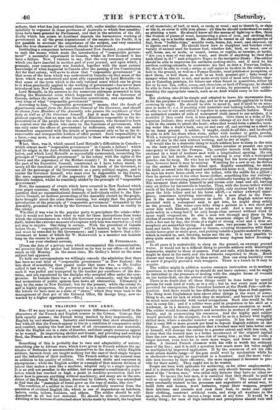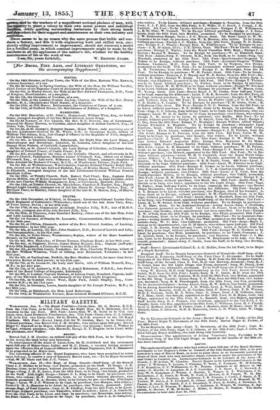THE trRAI1fIlrek OP TICE ARMT.
Bin—If we may trust report, a conspicuous 'difference evinces itself in the characters of the French and English armies in the Crimea. Courage they both equally possess; the French being -marked by fiery impetuosity, the English by cool steadiness. Industry and humanity they show abundantly ; but with ell this the French appear-to live in a condition of comparative order and comfort, makingthe best and most of all circumstances and materials, while the English are in a state of disorder, aticttheir ample resources appear to be wasted. In improvising shelter and transit, and-providing and cooking -food, the Yrench seem to be unrivalled, andthe English comparatively help- less.
'Something of this is probably due to -race and adaptability Of nature; something also to African wars, which have given to French soldiers the ap- titudes of Bedouins to accommodate themselves tothe desert ; while English soldiers, barrack-bred, are taught-nothing but the uses of their single weapon and the induction of their-uniform. The French soldier is the natural man in addition to his quality of soldier,with abundant shifts and resources in
es emergenci ; while the English soldier is asample of that minute division of labour that makes a man like a machine, adapted only to a single specialty. It is an evil net peculiar to-the soldier, buttoo-general-aconditionof a popu- lation which has reached so high a point in machine-production that few *now how to procure anything without machinery, and many are in the eon- dition of the French West-Indian, described by Cobbett, who was astonished to find that the "materials of bread grew on the tops of stalks, like rice."
The condition of a soldier in time of war is essentially removed from the -Reflation of civilized Englishlife, which is one of dependence on butchers, :bakers1 cooks, tailors, builders, and others. The soldier should be self- -depth ent in all but raw material. He should be able to construct his dwelling or his fortress of unburned straw bricks made by himself, the toughest , of all materials; of turf, or mud, or reeds, or wood ; and to thatch it, or slate or -tile it, or cover it with iron plates: all this he should understand as easily as pitching a -tent. Heahould know all the means of lighting:a ire from the friction of pieces of wood, hammering a piece of iron and striking flint on steel, up to a lucifer match. He should be versed in all the mysteries of fuel, from " buffalo chips," scrubby roots, bones, fat, wood, and charcoal, up to'lignite and coal. He should know how to slaughter and .buteher every -variety of animal used for human food, whether fish, bird, or beast, cow or • ealf, 'horse, ass, or mule or camel, swine, or reptile, or tortoise' ar turtle. " Are you a man of war luid in want, and doubt if anything belfood that bath blood in it ? " said-a-fugitive Negro to the navigator.Dnike. The soldier should be able to improvise his earthern cooking-stove, and if need be his earthen cooking-utensils, to economize his fuel as does a Peruvian Indian. He should be able to roast a swine or calf entire in its skin in the embers in a hole in the ground, as well as a Pampa Gaucho, roast potatoes or pumpkins, or stew them, or boil them, as well as an Irish peasant-girl ; bake bread or damper when biscuit is not, and make-every kind of meat into Chilian char- qui or Canadian pemican, for future use when found in quantities, either by fire or by sun. Tea, coffee, cocoa, and chocolate, or herb of Paraguay, he should be able to form into drinks without loss of aroma, by possessing and under- standing the appropriate vessels, such as an Arab would carry in-his 'saddle- His clothing should be simple and adapted, to leave his movements free, fit for the purposes of-warmth by day, and as far as possible applicable to forM covering by night. Ile should be able to mend it, and if need be on occa- sion to make it; i. e. if meeting with materials and lacking 'tailors, he should be able to cut it out and stitch it together in some serviceable fashion. Were an unlimited number of rolls of waterproof cloth issued to our soldiers, it is doubtful if they could form it into garments. Give them toe tribe of Pa- tagonian Indians they would cut them into oblongs of six feet by eight with a slit in the centre to admit the head ; when that wouldform a poncho, turn- ing water like a duck's back, easy on and easy off, and servingas &sheet to lie on damp ground. A soldier, if taught, could do all this; and hashould be able to sole his shoes when worn, either with leather or spas percha. With a waterproof poncho, waterproof boots, and a waterproof hood, he could stand all day in the rain without wetting, and be dry at-night. It would also be a desirable thing to teach soldiers how to sleep in the rain on 'the bare ground without wetting. Either cavalier or peasant can upon emergency do this on the Pampas. The cavalier travels with his bedding enclosed in a kind of leathern sack with a longitudinal opening. He can get into his bed inside the sack, and covering it over with a waterproof poncho, can lie snug. He who has no bedding but his horse-gear manages thus, however hard it may be raining. Watching for a cow or ox, he drives up the animal to obtain the driest spot. Rapidly unsaddling, he sticks -his knife or sword into the ground and tethers his horse to it. On the ground he lays his worst horse-cloth over the tether, with the saddle for a pillow ; then he spreads over it his other horse-clothes something like our railway- rugs, and a water-turning poncho over all, artistically turning in all the edges. The occupant then slides himself in and covers -over head and -all, leaving only an orifice for his nostrils to breathe. Thus, with the horse-tether within reach of his hand, he passes a comfortable night, only anxious lest a fox may gnaw the hide tether and let his horse adrift,—a rather awkward emer- gency, sometimes involving starvation ; for a man afoot in the Pam- -pas is the most helpless creature on earth. If all English soldier were provided with a waterproof sack to get into, he might sleep safely an the ground. The water-cure folks wrap a patient in .a wet sheet and cover him with blankets, and he takes no cold. And a man may sleep quite safely in a damp bed if he only keeps close covered without wind 'to cause rapid evaporation. So also a man wet through may sleep in his -clothes-if covered from the air. On the mountain ridges of Upper Peru, with a hot aun by day, the frosts of a night of strong wind and a thin at- mosphere are somewhat trying. Insuch cases, two persons lie in 'contact head and heels, like the guanoeos or llamas' covering themselves with their double horse-gear or mule-gear, and putting Outside a poncho soakedin water, which is-tucked in, and, freezing, keeps out the air. It is very possible 'to eleep quite sound so with the thermometer many degrees -below freezing- point.
In all cases it is undesirable to sleep on the ground, on swampy ground worse. It would not be a difficult thingto provide soldiers with watertight hammocks, similar to those of seamen. -Post and rails, with hooks in ranges, might-be fixed in the earth and the hammocks suspended to them. Much disease and many lives might be thus saved. Men can sleep healthily even in snow if properly provided with wrappers. There is a knack in it easy to acquire. The soldier might in addition receive common instruction art° sanitary questions, to-know the things be should do and leave undone; -and he might be instructed in the processes of dealing with the simpler forms of -wounds on the battle-field, ere the advent of the surgeon.
There is no doubt that all these things could be done better by special persons for each kind of work, as in a city ; but in war every man must he provided for emergencies, like Canadian 'hunters at the North. Pole—self-de- pendent. And there would be less difficulty in -teaching than at first appears. The thing most Englishmen hate above other things is the want of some- thing to do, and for lack of which they do mischief; and barrack life would be much more endurable with varied occupations. Such deo would be the -case in camp life ; and if a soldier were paid in proportion-to his skill As a -workman, as in a factory, there would be wholesome emulation at work. The soldier would .become adaptive and inventive in matters of comfort and health, and in economizing his resources. And the highly paid soldier would probably be the cheapest, for it would be as in a-factory with highly skilled men, where a smaller number are requisite. It has been computed that it costs 300 or more pounds per head to deposit English soldiers in the Crimea. Now, upon the assumption that strained man will take better care of himself, will damage the enemy to.a greater extent and with less -risk, it is clear that the trained man is a better investment of the original capital than the raw man, and there is less risk of losing him ; so that he yields a larger interest, even were he to earn more wages, and fewer men would suffice. A trained French chasseur with -his rifle is worth ten ordinary men of the hue; and it is still a question how much more his value might be multiplied by improved appliances. If by the resources of art his rifle could attain double range—if nhis,gun could work'by mechanism while he is sheltered—he might be equivalent to a hundred. And the more valu- able men become by their efficiency, -the more important it becomes to pro- 'vide for their safety. They ought not to be wasted. People are born with aptitudes for soldiering, as for other employments; and it is desirable that this class of Teeple only should become soldiers, in- -stead-of-the " broken men," who enlist only because they have no otherre- source. To insure the beat men, it is essential that they should be paid 'as well as equally skilful people in other walks of life. The nucleus of an army constantly trained to the -processes and -expedients of actual war, to build forts and houses, work batteries, repair their weapons, prepare their kitchens and utensils and cook their food, to make and repair their clothing, construct artificial roads, and sleep all weathers in the -open air, would serve to leaven a.large mass at any time. It would be a worthy thing, -for men of high intellect and perceptions -should rule tind levern,.andim-the-teachers of a magnificent national phalanx of men, -with the.capacitylo -plant a colony by their own moral powers and .indiiidual faculties, while noilling surrounding barbarians by their atrong hands and:dependent-for. their support and-maintenance on their own.industry and
resolution. .
There Deems lo ber.no 'reason why the -same .process that builds and'con- ducts a faetary, and-Ella it with -engineering work and skilled men, eon.- stantly adding improvement to improvement, should mot construct a model for. a,fortiliad camp, leriwhich.eonatant improvemente, might be made by the . residents. in all the.applianses of the soldier's life,; whether forthe healthy maintenaneenf life or-the mask. otwar.































 Previous page
Previous page